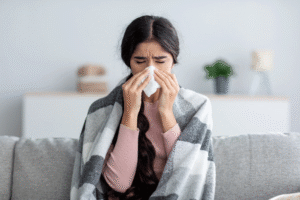
How to support workers during the heatwave
With parts of the UK set to achieve record-breaking temperatures, it’s essential to consider the risks and take action to keep employees safe.
As the temperature climbs, amid weather warnings that population-wide ill health effects are likely to be experienced, it’s important to consider how best to keep employees safe.
Heatstroke, when individuals become so overheated their internal ability to control their temperature breaks down, is a very real risk this week. One that if left untreated could lead to serious health complications, such as organ failure.
Although there are no legal guidelines for the maximum temperature UK employees are allowed to work under, it’s essential to keep employees comfortable. So here are five practical steps you can take to support employees through the current heatwave.
1. Tell employees to speak up if they feel overheated
As our clinical expert in this area, Susie Lamont, occupational health advisor for PAM OH explains, “Different people cope with heat in different ways, so there might be some individuals who are really struggling, while their colleagues feel fine.
This could put them under pressure to try and push through, when it’s important to alleviate the symptoms of overheating as quickly as possible. So make sure people feel safe coming forward for help if they start to struggle.”
2. Explain the symptoms to look out for
Educate employees about the symptoms of heat exhaustion so they can look out for these in themselves and others. These can include feeling thirsty and overheated, sweating profusely, developing a headache, dizziness or cramps in the arms or legs.
“Anyone experiencing these symptoms needs to stop what they’re doing and take measures to cool down,” says Susie. “Get them to move into the shade, drink cold water, sprinkle their body with cold water and even lie down and raise their legs slightly, to alleviate dizziness. If they don’t start to cool down, they could be at risk of heatstroke, which can lead to serious health complications, so call 111 or get them to A&E.”
3. Keep everyone hydrated
Staying hydrated is important at the best of times, but essential during a heatwave. Susie explains, “Our bodies are approximately 60% water so it’s essential to replenish fluids. It’s important not to get to the point where you feel thirsty so employees should be drinking at least a cup of water every hour.”
To support employees, make sure they have access to cold water, or non-sugary drinks, even if you have to bring these in. Plus encourage everyone to take regular breaks to ensure they’re drinking frequently enough to stay hydrated.
You can also share out our hydration leaflet to make sure employees know how important this is:
4. Relax dress codes
During a heatwave, it’s important to relax dress codes, so people can wear cooler clothes,” says Susie. “Unless you have air-conditioning, clothing is an important consideration for keeping cool. If possible, do not insist on employees wearing jackets or ties, or uniforms that are very warm, unless these are necessary to protect employees in other ways.”
Outdoor workers will also need to protect their skin from the sun and stay covered up. So provide PPE, in the form of cool long trousers and long tops if you don’t already do so. Also encourage employees to wear a sun hat, sunglasses and sunblock and make sure they’re regularly reapplying sunblock to areas that can get missed, like the tip of the ears.
5. Be flexible
The sun is at its hottest when the Earth’s axis brings us into closest contact with it between the hours of 11am and 3pm. So, if you have the option to alter shift patterns, in the way that councils have been scheduling bin collections to start and finish earlier, consider doing this.
Encourage everyone to stay in the shade between 11am and 3pm. You might even want to follow the lead of countries used to dealing with these temperatures and allow people to take a ‘siesta’ or extended lunch hour, if working hours allow. If not, monitor the temperature employees are being asked to work under and if it becomes dangerous, there may come a point where work has to temporarily go on hold for health and safety reasons.
Summary tips for employers:
- Provide access to cold water, or other drinks that aren’t too sugary
- Tell employees to speak up if they feel overheated, instead of struggling on
- Relax dress codes so people can wear cooler clothes or, for employees who are working outside, provide PPE in the form of cool long trousers and long tops
- Provide education on staying sun safe, for example by encouraging employees to avoid direct sunlight during the hottest part of the day, between 11am and 3pm
- Make sure employees are applying sunblock, especially to the tips of their ears
- Be prepared to down tools or shift working patterns if the heat gets too much
Summary tips for employees:
- Stay hydrated by drinking a cup of water every hour, feeling thirsty is a bad sign
- Stay in the cool or shade when the sun’s rays are at their strongest (11am – 3pm)
- Wear cool clothing, including a sun hat and sunglasses to protect your eyes
- Apply sunblock and reapply regularly, especially to overlooked areas such as the ears
- If you feel dizzy, thirsty, overheated or have a headache take measures to cool down
- If you’re struggling to cool down, get emergency help by calling 111 or going to A&E
How we can help…
To help you mitigate heat risks we provide the following services:
Heat Risk Assessments – review of health and safety plans to identify heat risks and ensure measures being put in place to mitigate these are appropriate
Heat Safety Education – workshops, webinars and other e-learning materials to educate employees about heat and sun risks and equip them with insights to protect themselves
Occupational Health – onsite clinics and occupational health presence to monitor, support and educate employees about heat and other health and safety risks
Email info@pamgroup.co.uk or call us on 01925 227 00 to set up a free consultation to discuss ways of reducing heat risks at your organisation.
Related Insights
Flu season is coming early – is your workplace ready?
How to respond to the rise in employee drug and alcohol use
Reducing work-related illness with health surveillance
Occupational health insights on keeping your people healthy and productive
Want to have our latest research, case studies and opinions
delivered straight to your inbox?





